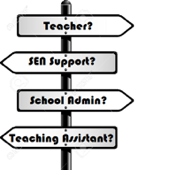Which way to go?
 There are many ways to begin working in education. My recommendation would always be to try to volunteer first. You can put yourself forward for an extra hand at breakfast club, after school clubs or just a general volunteer in a school for a TA position, lunch time supervisor, playground attendant etc. If you aren’t opting for the teaching route, there are so many other roles that schools are looking to fill every day!
There are many ways to begin working in education. My recommendation would always be to try to volunteer first. You can put yourself forward for an extra hand at breakfast club, after school clubs or just a general volunteer in a school for a TA position, lunch time supervisor, playground attendant etc. If you aren’t opting for the teaching route, there are so many other roles that schools are looking to fill every day!
You may be interested in working in education, but are unsure of what you can do to after you graduate or with your current qualifications/experience. You don’t always need to have experiences; you don’t always need to have completed a course. You need to have a strong work ethic and have a genuine interest in making a difference in children’s learning! See below for just some of the positions that could be right for you!
Teaching Assistant (TA)
A Teaching assistant is a teacher’s right hand, the second in command of the class. As a TA you might work with a select group of children, or have to move around the class while they are working on an activity. Some TA’s will also take small groups out of the classroom to focus on certain aspects of their learning. The teacher will identify tasks and activities that are required and it’s the TA’s job to oversee that these are completed. Some tasks may be listening to children read, helping prepare for a lesson or even be a second set of eyes to monitor students’ behaviour and progress.
HLTA (Higher Level Teaching Assistant)
 A HLTA is someone who has progressed from a TA, usually through an NVQ course whilst working at a school. They can line manage TA’s, mentoring them and helping them progress in their role. They can also be used in a similar way to a cover supervisor, covering lessons whilst the teacher is absent from the room. HLTA’s are given extra responsibilities within the school and are therefore on a higher pay rate than TA’s.
A HLTA is someone who has progressed from a TA, usually through an NVQ course whilst working at a school. They can line manage TA’s, mentoring them and helping them progress in their role. They can also be used in a similar way to a cover supervisor, covering lessons whilst the teacher is absent from the room. HLTA’s are given extra responsibilities within the school and are therefore on a higher pay rate than TA’s.
Learning Support Assistant (LSA)
A Learning Support Assistant is someone who works with one child. You would support a student on a 1:1 basis who has been identified as needing extra support in a certain area of their learning. The pupil may have a statement of Special Educational Needs (SEN) such as Autism or ADHD. Like a TA, you will support the student’s academic work, however you may also need to support other areas such as confidence or emotional support. As you are working 1:1, you tend to build a strong relationship and understanding of the student’s needs.
Learning Mentor
A Learning Mentor is someone who provides a complementary service to teachers and other staff, addressing the needs of learners who require help in overcoming barriers to learning in order to achieve their full potential. You work with a range of learners, but give priority to those who need the most help, especially those experiencing multiple disadvantages. The variety of issues covered is vast, ranging from punctuality, absence, challenging behaviour and abuse to working with able and gifted learners who are experiencing difficulties. You would work with children or young adults on a one-to-one basis or in small or large groups.
SENTA (Special Needs TA)
As a special needs teaching assistant you will be supporting students with special needs and learning difficulties. These could be difficulties such as Autism, ASD (autistic spectrum disorder), Aspergers, Downs Syndrome, Mild- Severe learning difficulties and a range of mental and physical needs. You are expected to help the teacher deliver lessons, working 1:1 or in groups with students supporting them with their work. You will adapt your approach and support to each student depending on their needs, helping them understand their work and to reach their goals. You can work with challenging behaviour but it is an extremely rewarding role as you often get the opportunity to see students through their school year, supporting them until they reach their full potential.
Cover Supervisor
 A cover supervisor is someone who is likely to be used for short-term absences of a teacher. A typical day as a cover supervisor would be, supervising children within a classroom setting, responding to any questions they may have, collecting any completed work after the lesson and returning it to the appropriate teacher. You are basically a stand-in teacher, usually there to cover PPA time or short term absences. Cover Supervisors are not usually required to prepare lesson plans but can sometimes be expected to mark work and complete necessary reports. As such, applicants to this position would be expected to be educated to degree level or equivalent.
A cover supervisor is someone who is likely to be used for short-term absences of a teacher. A typical day as a cover supervisor would be, supervising children within a classroom setting, responding to any questions they may have, collecting any completed work after the lesson and returning it to the appropriate teacher. You are basically a stand-in teacher, usually there to cover PPA time or short term absences. Cover Supervisors are not usually required to prepare lesson plans but can sometimes be expected to mark work and complete necessary reports. As such, applicants to this position would be expected to be educated to degree level or equivalent.
These are just a few of the job titles you could be qualified for or interested in. There are also support roles such as:
EAL support/tutor
(English as an additional language) You will support students with their work 1:1 or in groups who have a different native tongue and need additional support to help understand and break any language barriers.
Behavioural support
You will help students who struggle to adhere to school regulations and behavioural expectations to adjust their attitude, outlook and practices. You will support them on a pastoral level as well as academic helping to resolve any issues and liaise regularly with teachers and support staff to resolve any issues or barriers.
Transition Support
 You will support students who are transitioning to either a new school or back into education, to settle into their new routines and school life. Transitioning back into education or a new year can be daunting and stressful for children. Schools require staff to ease this transition by supporting students emotionally as well as make the expectations and events of school life clear. You will support pupils with social skills helping them create personal relationships and behave appropriately towards others. You will support any academic queries or struggles students may have and advise them.
You will support students who are transitioning to either a new school or back into education, to settle into their new routines and school life. Transitioning back into education or a new year can be daunting and stressful for children. Schools require staff to ease this transition by supporting students emotionally as well as make the expectations and events of school life clear. You will support pupils with social skills helping them create personal relationships and behave appropriately towards others. You will support any academic queries or struggles students may have and advise them.
These are just some of the support roles you can undertake in schools. Anyone who is a keen worker and has a passion for education can find the ideal role, or we can help find it for you! If you’re unsure and would like to discuss the potential positions in schools in more depth, feel free to contact us so we can help set you on the right path towards your chosen career!
– Danni — SEN Consultant




